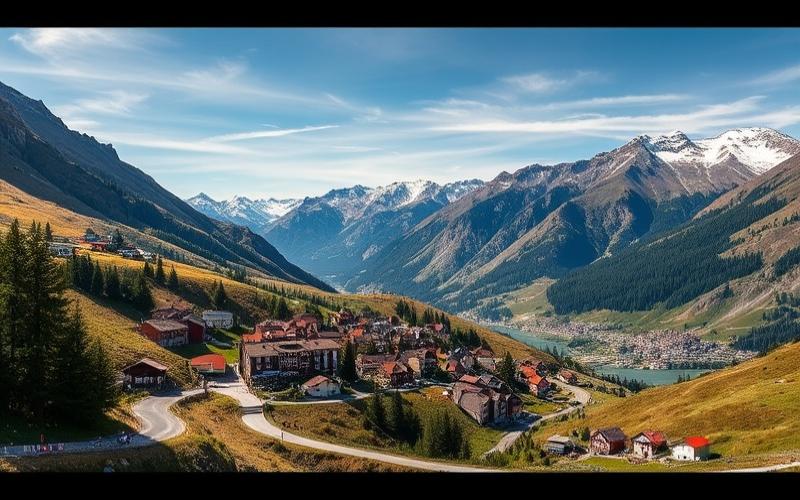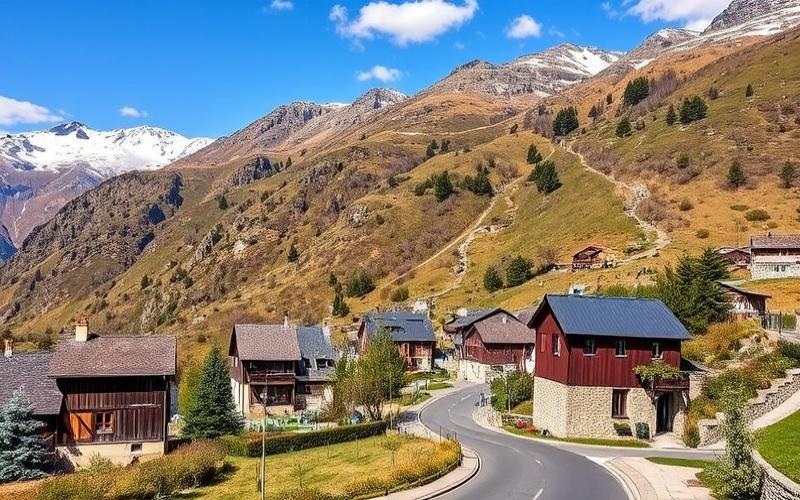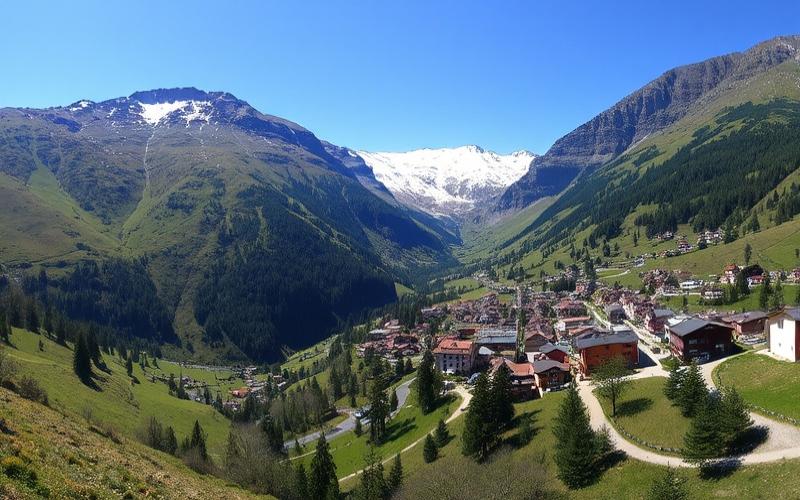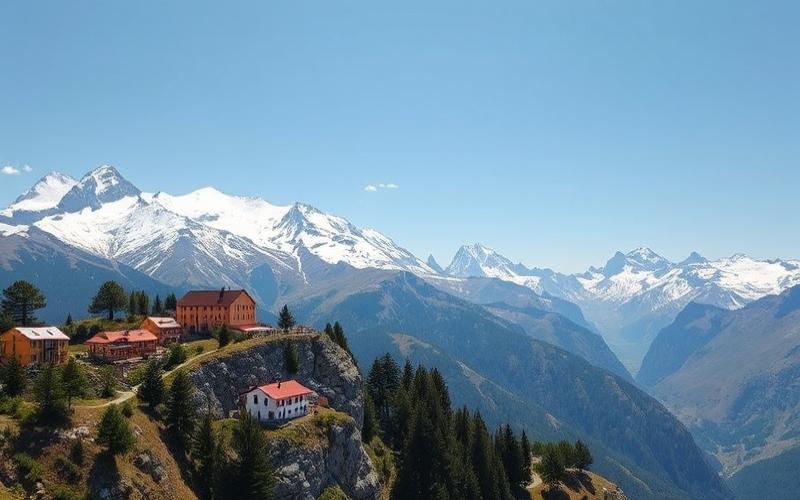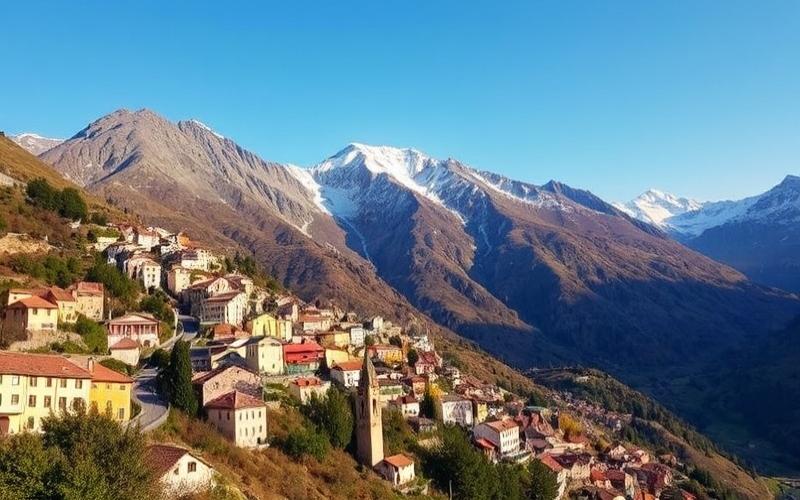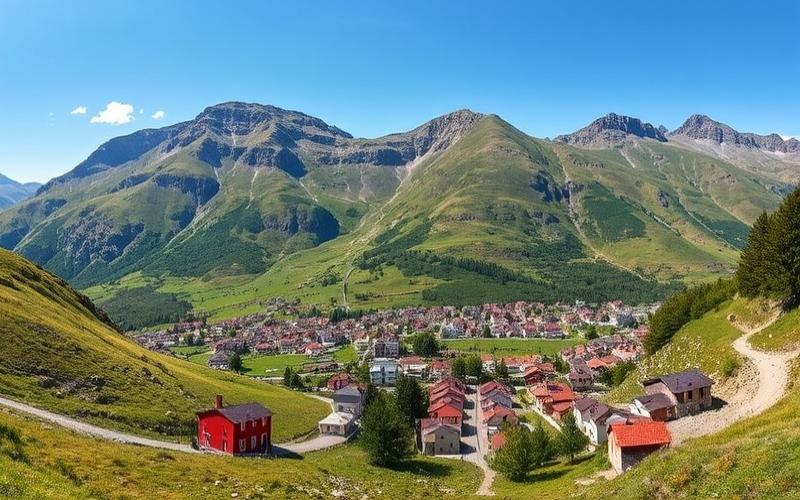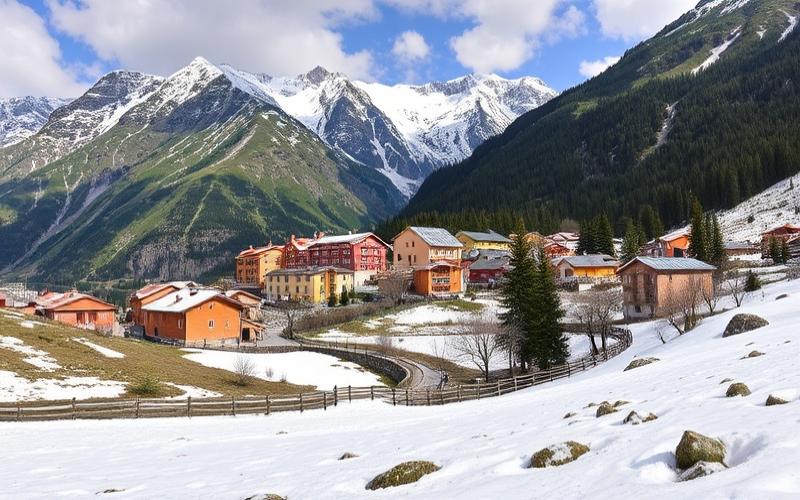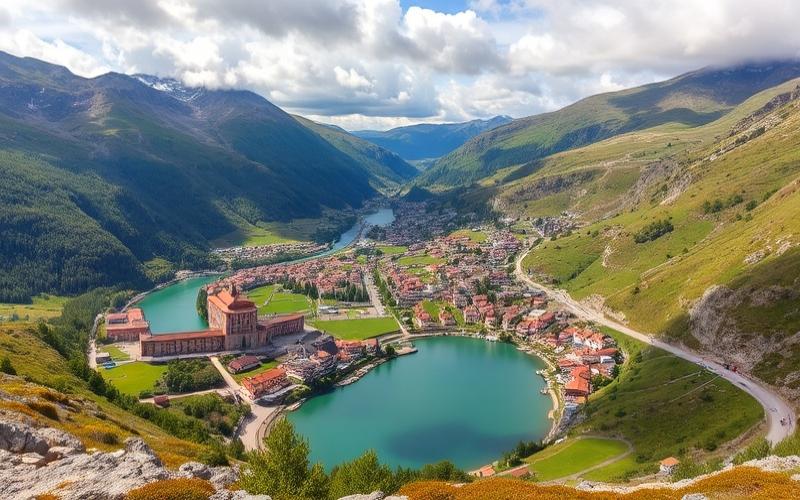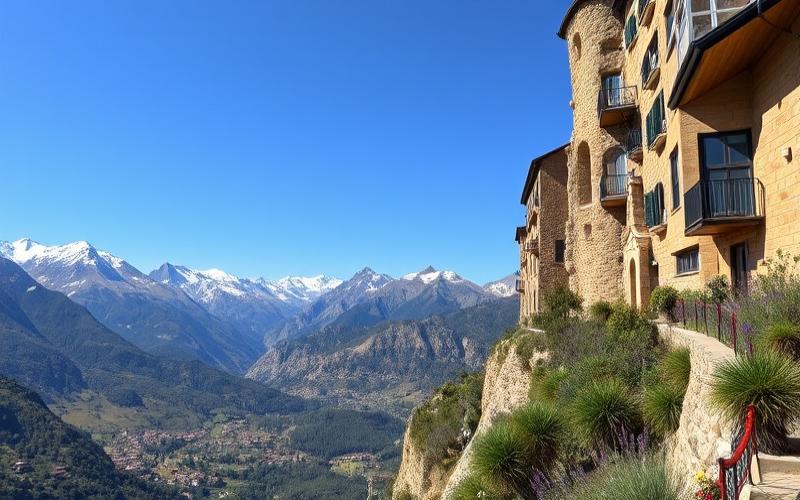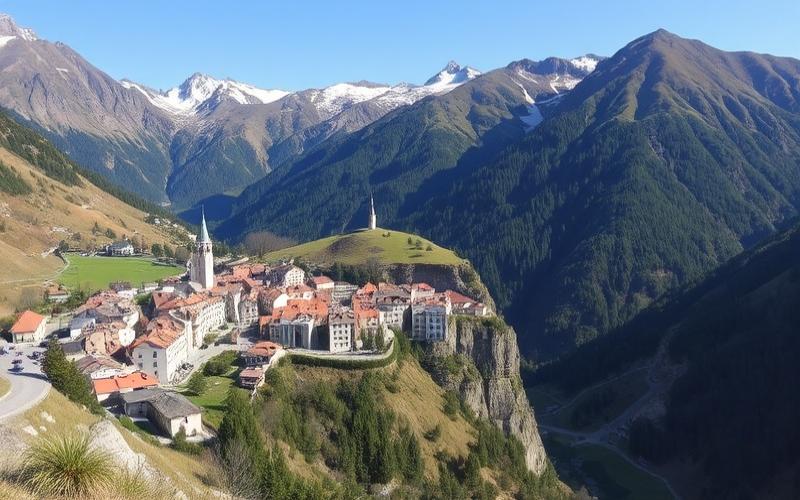
 Published on and written by Cyril Jarnias
Published on and written by Cyril Jarnias
Real Estate Inheritance in Andorra
Real estate inheritance in Andorra, a small country nestled in the heart of the Pyrenees, represents both an opportunity and a challenge due to its unique jurisdiction combining French and Spanish influences. Understanding the complete procedure of this operation is essential for anyone wishing to navigate the legal subtleties of this specific environment.
This article will guide you through the key steps, from property assessment to understanding tax obligations, while exploring the nuances of inheritance rights that can differ significantly from those found elsewhere in Europe.
Whether you’re a potential heir or legal advisor, this detailed overview aims to demystify the process, making this complex path more accessible and transparent.
Good to Know:
Inheritance rights in Andorra can vary depending on the nationality of the deceased and heirs, as well as the nature of the assets being transferred.
Understanding Inheritance Laws in Andorra
The legal framework for inheritance in Andorra is primarily based on the Andorran Civil Code and specific law 46/2014 on succession due to death. This system is distinguished by its testamentary flexibility, absence of inheritance taxation, and certain legal transmission obligations.
Fundamental Principles:
- Succession opens upon death, encompassing all assets, rights, and obligations of the deceased.
- The will is the central instrument allowing free organization of asset distribution; it can be modified or revoked at any time.
- In the absence of a will, the legal order applies: direct descendants, direct ascendants, surviving spouse, collateral relatives, then the State.
Applicable Legislation:
| Andorran Civil Code | Law 46/2014 (succession) |
| General rules | Mandatory testamentary restrictions |
| Variable reforms | One-quarter reserved for children or ascendants; one-quarter to spouse if needed |
The applicable inheritance law generally depends on the nationality of the deceased, unless evidence shows a closer relationship with Andorra.
Application to Real Estate:
- Real estate successions follow the formalities of the Land Registry and Cadastre.
- Inter vivos transfers (donation or sale) must be formalized before a notary and recorded in official registers.
- International conventions may influence the fate of properties in cases of multiple jurisdictions.
Heirs’ Rights:
- Each heir may accept or renounce the succession (pure acceptance/with benefit of inventory).
- A legal period is granted for them to decide.
- Heirs must pay any debts before any distribution of assets.
Summary list of rights:
- Acceptance/renunciation formalized by notarial act
- Right to a reserved portion for children/ascendants/spouse
- Proportional distribution according to inheritance rank
Procedure for Establishing Succession:
- Obtain death certificate
- Register death with civil registry
- Verify existence/will
- Tax declaration (no inheritance tax)
- Settle debts/preliminary administrative matters
- Distribution among heirs
Andorran Specificities vs Other European Systems:
| Characteristic | Andorra | France/Spain |
| Inheritance tax | None | Yes |
| Testamentary freedom | Broad but limited by mandatory reserved portions | Variable depending on hereditary reserve |
| Trusts | Not recognized | Sometimes recognized |
In practice:
A French expatriate resident in Andorra dies leaving two adult children and a spouse without personal income.
Under Andorran law:
* One-quarter goes mandatorily to the children;
* One-quarter goes to the surviving spouse;
* The remainder is freely allocated according to the will or shared intestate if none exists;
* No tax is due on this patrimonial transfer;
Exceptions/Particularities Related to Nationality:
- If the deceased had another nationality but primarily resided in Andorra: potential application of personal law unless stronger connection with Andorra.
- For foreign real estate owners in Andorra: identical notarial procedures; complete absence of local inheritance taxation.
Special case:
A Spanish citizen owning an apartment in Andorra dies without a will.
Local rules apply for this real estate property; legal order will be followed (descendants then others), without local inheritance taxation or recognition of potential Spanish trusts.
Important highlight:
In Andorra,
no tax applies to patrimonial transfers due to death,
nor to those made inter vivos,
which constitutes a major difference with other neighboring European states.
Finally, all these procedures absolutely require recourse to local notaries so that each operation is recorded in the competent public registers—an essential guarantee both for securing and authenticating each inheritance step in this unique regime.
Good to Know:
Andorran inheritance legislation is primarily governed by the Andorran Civil Code, which provides a specific framework for the transfer of real estate properties. In Andorra, unlike other European regimes, there is no strict hereditary reserve, granting greater testamentary freedom to the deceased. Legal heirs must be formally identified, and succession is typically notarized to ensure its validity. Inheritance rules differ depending on whether heirs are residents or not, since for foreigners, the law of the last legal domicile may apply. Furthermore, succession costs are often less financially burdensome than in other European countries, making Andorra an attractive option for international estate planning. For example, a non-resident property owner could choose to bequeath their property without being subject to the heavy taxation observed elsewhere in Europe.
Taxes and Inheritance Rights for Foreigners
In Andorra, there are no inheritance rights or taxes on inheritances, including for foreigners owning real estate properties in the country, under certain conditions.
Tax Treatment of Foreign Heirs vs Andorran Residents
- Total exemption: Inheritances, whether concerning residents or foreigners, are not subject to any inheritance or gift tax, provided the deceased was an Andorran tax resident and the transferred assets are located in Andorra.
- Residency condition: To benefit from this exemption, the deceased must have Andorran resident status. Heirs, whether foreign or resident, do not pay inheritance rights as long as these conditions are met.
- Applicable inheritance law: Andorran inheritance law favors the deceased’s wishes (will), but also protects certain reserved heirs (spouse, children).
Double Taxation Agreements
Andorra has signed several conventions to avoid double taxation, but these mainly concern income tax rather than inheritance rights.
In the absence of inheritance tax, the question of double taxation does not arise in matters of succession.
Impact of Taxes on Net Value of Inheritances
- No fiscal impact: The complete absence of inheritance or gift rights in Andorra means the net value of the inheritance is not reduced by local inheritance taxation.
- International comparison: This gives Andorra a competitive advantage compared to most other European countries, where inheritance rights can reach 30% or more.
Administrative Procedures for Foreign Heirs
- Steps to follow:
- Obtain death certificate and certificate of inheritance.
- Register succession with Andorran civil registry.
- Draft or present a will compliant with Andorran legislation.
- Complete liquidation and distribution of real estate assets, without specific tax formalities related to inheritance tax.
- International successions: If the succession includes assets located outside Andorra, it’s advisable to seek specialized legal counsel to avoid conflicts of law.
Specific Exemptions or Reductions
- No taxes to reduce or exempt: Given the complete absence of inheritance rights in Andorra, there are no exemption or reduction mechanisms to apply for certain beneficiaries or types of assets.
- Only exception: The essential condition is the tax residency of the deceased in Andorra and the location of assets in the country.
| Key Points | Andorra (residents and foreigners) |
| Inheritance rights | None |
| Exemption condition | Tax residency of deceased in Andorra |
| Treatment of foreign heirs | Identical to residents |
| Double taxation agreements | Not applicable to successions |
| Administrative procedures | Standardized, without tax formalities |
| Exemptions or reductions | Not necessary, due to absence of tax |
| Impact on net value of inheritance | No local fiscal deduction |
Key Takeaway
The complete absence of inheritance rights in Andorra for real estate properties owned by foreigners (subject to the tax residency of the deceased) allows patrimonial transfer without reduction in net value due to tax, distinguishing the country from most other European jurisdictions.
Good to Know:
In Andorra, foreigners inheriting real estate properties are subject to the same tax rules as national residents regarding taxes and inheritance rights, as the country does not levy inheritance rights, constituting a significant advantage. However, it’s crucial to verify double taxation treaties, some of which might concern conventions established by Andorra with other countries, to ensure no additional levies are applied in their country of origin. Heirs must nevertheless undertake necessary administrative formalities, such as registering the succession with Andorran authorities, to guarantee the regularity of property transfers. Although there are no specific exemptions or reductions for foreigners, their status does not fiscally burden the succession in Andorra, which can have a significantly positive impact on the net value of inherited real estate.
The Role of the Notary in International Succession
The notary plays a central role in managing and liquidating an international succession, particularly when real estate assets are located in Andorra and other jurisdictions.
Their intervention guarantees legal security, respect for the deceased’s wishes, and proper application of local and international laws.
Main Responsibilities of the Notary in International Succession Involving Andorra:
- Verification of will existence and its compliance with applicable laws (Andorran and foreign).
- Determination of heirs according to Andorran law, which favors legal order or the will, considering local law specificities, such as priority of surviving spouse in absence of descendants.
- Acceptance or renunciation of succession: the notary collects declarations of acceptance or renunciation, an indispensable act for heirs.
- Liquidation of succession: they proceed with inventory, debt payment, asset distribution, and tax declaration, while respecting Andorran and foreign rules.
Required Specific Competencies:
- Mastery of private international law, particularly to determine applicable law in case of conflicts of law (Andorra differs from European regulation No. 650/2012 by favoring the nationality of the deceased rather than habitual residence).
- Ability to interpret and apply foreign and Andorran legislation, including inheritance taxation, which is very advantageous in Andorra (virtual absence of inheritance rights for direct heirs).
- Capacity to handle multilingual documentation and cooperate with foreign notaries or lawyers.
Notary’s Mediator Role:
The notary acts as an impartial third party between heirs of different nationalities, facilitating communication and seeking amicable solutions.
They organize meetings, clarify rights and obligations of each party, and ensure compliance with deadlines and formalities specific to each country.
Examples of Typical Cases Where Notary Intervention is Crucial:
- Succession of a French resident owning real estate in Andorra and bank accounts in Spain: the Andorran notary collaborates with counterparts to liquidate assets, apply correct tax regimes, and ensure respect for last wishes.
- Inheritance without will where heirs reside in multiple countries: the notary must identify applicable law, organize notarial acts, and manage asset distribution, considering the rights of each jurisdiction.
Practical Tips for Heirs:
- Choosing a notary experienced in international successions is essential to avoid misinterpretation of laws, conflicts between heirs, and administrative delays.
- Prepare documents in advance (will, property titles, death certificates, etc.) in appropriate languages.
- Ask the notary to clearly explain tax impacts and procedures in each concerned country.
| Key Notary Competency | Application in Andorran International Succession |
| Mastery of international law | Determination of applicable law |
| Interpretation of local laws | Application of Andorran law on real estate |
| Multilingual management | Translation and validation of documents |
| Mediation between heirs | Resolution of conflicts between parties from different countries |
| Administrative coordination | Compliance with formalities and deadlines in each country |
Key Takeaway:
Recourse to a competent and specialized notary secures the entire succession procedure, optimizes taxation, and prevents disputes, especially when succession involves real estate in Andorra and other jurisdictions.
Good to Know:
In the context of successions involving real estate properties in Andorra, the notary’s role is essential for navigating the complexity of international and local laws. Indeed, the notary is responsible for reconciling legal differences between concerned countries, often acting as an impartial mediator to guarantee that all heirs’ rights are respected. For example, in a succession involving properties in Andorra and France, the notary must understand the subtleties of inheritance law in both countries and ensure liquidation complies with concerned legislations. Their expertise is crucial for properly evaluating property values in each jurisdiction and ensuring applicable taxes are correctly calculated. They also guide heirs through the administrative maze to avoid potential transnational disputes. Choosing a notary experienced in international successions is therefore strongly recommended, as they can anticipate potential conflicts and skillfully navigate distinct regulations, making the entire process less stressful for heirs.
Tips for Facilitating Cross-Border Transfer
Anticipation is fundamental in matters of cross-border succession in Andorra, where the complexity of national and international legislation requires rigorous planning to guarantee legal and tax security for heirs.
Main Administrative Procedures to Anticipate:
- Consultation with specialists: It’s imperative to consult an expert in private international law as well as a tax specialist mastering Andorran specificities and those of concerned countries, to anticipate legal and tax implications of the succession.
- Verification and drafting of will: Ensure existence of a will compliant with Andorran requirements, possibly translated, and authenticated by competent local authorities.
- Establishment of patrimonial inventory: Prepare a detailed declaration of assets, covering assets located in Andorra and abroad, to facilitate evaluation and distribution.
- Obtainment and legalization of documents: Gather essential documents (death certificate, notarial certificate, property deeds, tax certificates), translated and apostilled if necessary.
- Registration with registries: Proceed with registration of ownership changes in land, cadastral, and investment registries of the Principality.
Key Documents to Gather:
| Document | Main Usefulness |
|---|---|
| Will (translated if necessary) | Determination of deceased’s wishes and heirs |
| Asset declaration | Inventory and valuation of assets |
| Death certificate | Justification for succession opening |
| Notarial certificate | Official identification of heirs |
| Property deeds and land titles | Proof of ownership and location of real estate properties |
| Tax certificates | Calculation of tax rights and obligations |
Tax Conventions and Minimizing Double Taxation:
- Andorra has concluded tax conventions with certain countries (notably France, Spain, and Portugal) to avoid double taxation on successions and gifts. These should be referenced to determine heirs’ tax obligations, according to their residence and asset location.
- In absence of convention, each country may tax assets located on its territory, hence the importance of prior analysis by a specialist.
Local Specificities and Legal Differences:
- Applicable law: In Andorra, local succession law applies to assets located in the territory, unless contrary provision provided by a will drafted according to legal forms. However, Andorra has not ratified the European succession regulation, limiting application of certain facilities provided for EU nationals.
- Transfer of real estate properties: Transfer of Andorran real estate requires procedures with local authorities, and may be subject to specific rights depending on the tax situation of the deceased and heirs.
- Tax exemption: Successions are原则上 exempt from tax in Andorra if the deceased was an Andorran tax resident and the will complies with local law. For non-residents, other legislations may apply, making planning even more essential.
Key Takeaways:
- Inform and anticipate with specialized professionals to secure patrimonial transfer and avoid conflicts of law or double taxation.
- Master legal differences between Andorra and other concerned countries is crucial to effectively organize succession and preserve heirs’ interests.
Advance planning, supported by legal and tax expertise, remains the key to successful cross-border succession in Andorra.
Good to Know:
To navigate cross-border succession in Andorra, advance planning is crucial. It’s advisable to consult specialists in international law and taxation to identify appropriate administrative procedures and existing tax conventions that minimize double taxation, particularly with France or Spain. Having key documents like translated wills and asset declarations facilitates the process, as does familiarization with Andorran inheritance laws. Understand legal differences regarding real estate property transfers, as they can affect foreign heirs, thus avoiding unnecessary complications.
Disclaimer: The information provided on this website is for informational purposes only and does not constitute financial, legal, or professional advice. We encourage you to consult qualified experts before making any investment, real estate, or expatriation decisions. Although we strive to maintain up-to-date and accurate information, we do not guarantee the completeness, accuracy, or timeliness of the proposed content. As investment and expatriation involve risks, we disclaim any liability for potential losses or damages arising from the use of this site. Your use of this site confirms your acceptance of these terms and your understanding of the associated risks.










